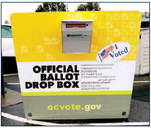ARE BAGS ACCEPTED? Liners ….
ARE BAGS ACCEPTED? Liners are optional. Plastic and bioplastic “compostable” bags are accepted in the organics container, but must be CLEAR or translucent-green, and bag contents must be visible. Acceptable organics will be processed, but the bags will not be recycled or composted.
WHERE CAN I GET MORE INFORMATION? Athens is here to support the community with this new program and will provide resources and training to help you get started. If you have any questions about the new organics collection program, contact Physical Property at (562) 431-6586, ext. 365, or visit AthensServices. com/Food.
Participating is easy.
1. FILL
Fill your personal countertop pail with food scraps and acceptable items. (Liners are optional. Consider newspaper or a paper bag. Plastic bags must be clear.)
2. EMPTY
Empty pail contents into your green organics container.
Athens Tip: Store meat and dairy scraps in a container in your freezer and place in the green organics container on collection day.
3. RINSE & REPEAT
Rinse out pail with soap and water. Fill again. Sprinkle lightly with baking soda to absorb odors.
Acceptable Organics Waste
Green Waste
• Flower and hedge trimmings (from personal gardening)
• Grass clippings
• Leaves and branches
• Lumber, scrap wood, plywood (not painted or treated)
• Weeds Food Scraps
• Bread, rice and pasta
• Cheese and dairy
• Coffee grounds and filters
• Fruits and vegetables
• Flowers and herbs
• Meat, bones and poultry
• Seafood and soft shells
• Pet food (non-medicated) Food-soiled Paper
• Food-stained paper
• Paper egg cartons
• Paper napkins and kitchen towels
• Pizza boxes
• Plates
• To-go boxes (no coating)
• Wooden and fiber-based utensils Food-soiled paper must be 100% fiber-based (no materials with petroleum based plastic, wax or bio-plastic coating, liner or laminate).
Unacceptable Organics Waste (Do Not Include)
• All plastics
• Cacti, succulents, yucca
• Compostable plastics (bioplastics)
• Coffee cups and pods
• Fats, oils and grease
• Food stickers (remove from produce)
• Gloves
• Hard shells (clams, mussels, oysters)
• Medication
• Palm fronds
• Paper napkins, towels with cleaning chemicals
• Parchment and wax paper
• Pet waste
• Rocks and soil
• Rubber bands and twist ties
• Tea bags
• Textiles
• Tissues and wet wipes



